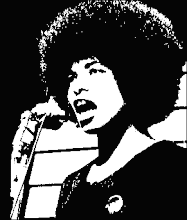I'd like to start by thanking Dr. Krouse for her guest lecture.
While reading this article I couldn't help but think about our discussions regarding post-structuralist/post-colonialism and Spivak and the importance of hybridity in post-colonial criticism. I find that this logic holds true for feminist theory as well and is worth the examination. It is understandable that there is an ambiguity in feminist theory and in feminist politics primarily because they exist within and from a patriarchy that is the antithesis of feminist opinion, literally. Whether we rely on the "basic" definition which promotes equal rights for women or the more intricate sociological questions about agency in sexuality for women, we are observing and dissecting questions that arose from a masculine dominance. I'd like to refer to the blog post we read, "The Context," in which the blogger is confronted about her "negative" reaction to a sexist comment (I'd like for you to wrap your head around that phrase...a negative reaction- this can also be applied to the notion of being surrounded by the context of misogyny and female subjugation). This issue of context is raised in her post and is something that we discussed about Spivak and the deconstruction of one's position as the 'colonized' in a setting controlled by the very oppressors.
"The thing is- from the minute I leave my house in the morning I am inundated by misogynistic messages, from the things I hear people say to the images I see all around me. For every one time that I make any sort of comment on these messages there are approximately 1,172 times that I've recognized something as sexist and not said anything. There are about 5,249 messages that I didn't even pick up on." -from The Context
In the same way that acknowledges her surroundings as male-dominant and misogynistic by nature (which Dr. Krouse also mentions about feminists as women 'who see sexism at every turn'), Spivak is able to observe her participation and proliferation of Western liberal discourse and both of these understandings suggest a refer to the notion of hybridity in critical identity. That seems like a bizarre term but really it is valuable to observe one's perception- the why to studying theory, in order to think about how we think and perceive our surroundings.
With that in mind, I would argue that being objectively aware of one's juxtaposition as a critic, and more importantly as a person, must and does have an effect on one's political opinions. All the theories we have explored have based their arguments in how to read literature and, therefore, how to language which is the base way in which we experience our worlds. Arguably then, there is a theory being developed about lifestyle and personal politics whether minute or grandiose, when dissecting literature. It seems impossible to enter a text without preconceived notion about what a text is trying to suggest culturally, socially, and even just literally, especially after having delved into the theories themselves.
As far as limitation or expansion in thought when coming from a particular political stance there is a need to examine the fact that even political agenda is not concretely defined within itself because of the variations in opinion and circumstance regardless of political position. Even in direct politics, Republicans and Democrats are seen on a scale of political opinion within politics and within each party there exists a range from moderate to radical. This also exists in the world of theory and can be painted fairly well in the realm of feminism. A prime example is that of women and sexuality- is there no possibility of agency because of the masculine constructs of sex or are women able to define sexuality by their own terms- can we do so in a world were we are defined in our relation to men, as Dr. Krouse mentioned. The range in approaching texts exists, so, it is likely that there would be a range in limiting and expanding ideas when approaching texts and culture according to extremity and where one can position herself in the context.
Peace,
Priscilla
Note on the title- I heard this song while writing this blog entry and it seems appropriate when discussing the feminist position, whether extreme or hybrid, in the context of the patriarchy.
Final Post
17 years ago

No comments:
Post a Comment